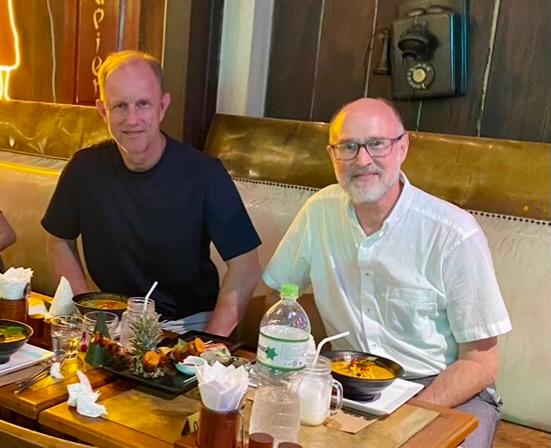How an Unknown Leadership Rock Star Changed the World
This article is a reflection on the life of Robert Walter, a Christian leader of courage, heart and brains.
Brent Hoover

Oil. Invisible to the human eye yet very abundant to those who know how to find it. Robert Walter knew how to help people find oil.
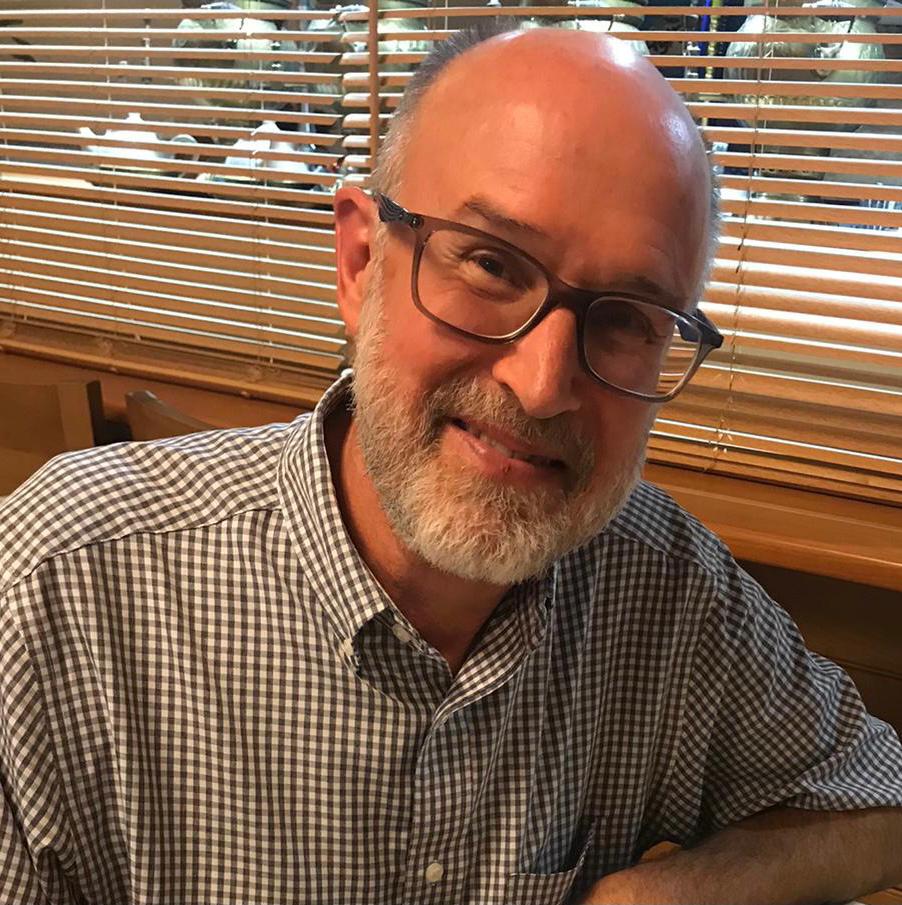
Searching for it beneath the rocky outcrops near Midland, Texas is what captured Robert’s talents for twelve years. His keen eye and brilliant geological skills made him valuable to the company who needed to find this precious resource in places where no human eye could see.
He knew that what the rock science told him would not lie. Though the presence of oil was hidden he would walk near the crags and stop and say, “This is it; put a drill down here.” And that oil company did what he said, drawing out an abundance of black gold for years to come.
God no doubt planted that experience in his heart for a purpose, because for the remaining decades of his life he went in a different direction, plumbing the depths of people’s hearts and drawing out something more precious than oil: spiritual life, joy, and freedom. He called it being “on God’s trail.” He once wrote about it.
“After 12 years as a geologist, I followed God’s trail into the ministry as a pastor. Then after walking on that trail for 15 years, God invited me to take a new trail that brought me into the ministry of training, coaching, and counseling leaders – building them up so they can build others up. It doesn’’t matter if those leaders are parents or pastors, counselors or coaches; I want to help them be more so they can do more for the people around them. This path has brought me to Asia, Africa, and Latin America.”
I had the privilege of knowing Robert because I accompanied him on part of that path when we joined the ministry of LeaderSource the same month. We often shared the same room during our own training weeks where I would receive an extra dose of Robert – an extra dose of grace – and our friendship grew over the years. Then, in 2020, leukemia invaded his once strong body. It was a day of great loss when he finished his race and died on February 4, 2021.
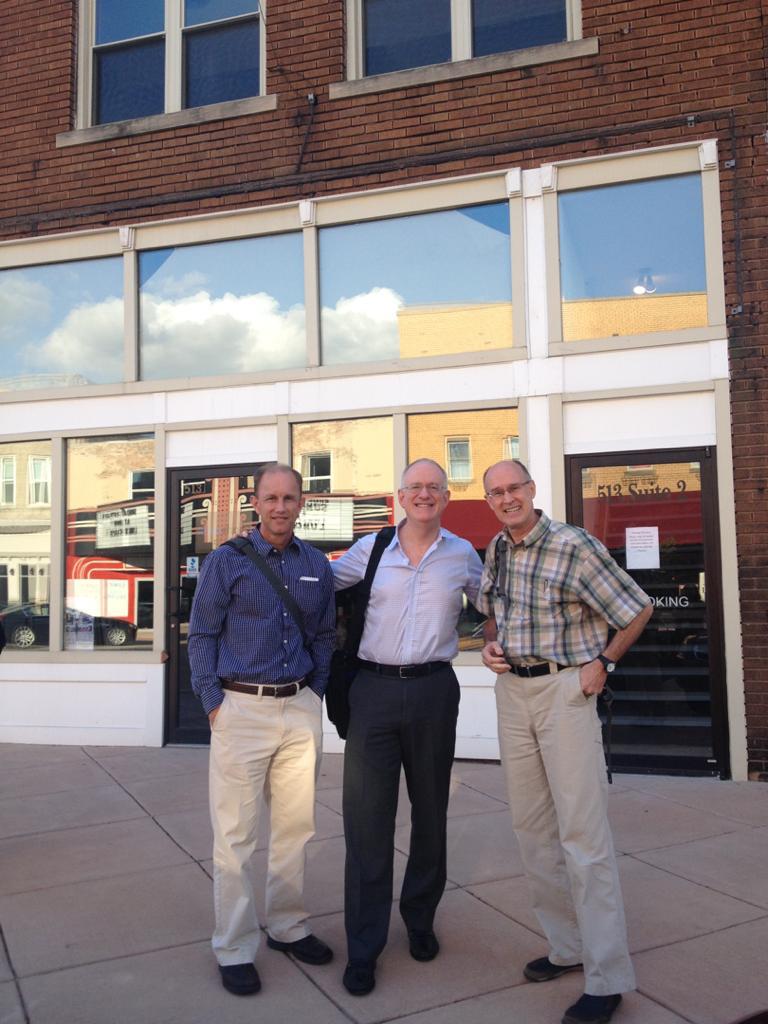
Robert’s legacy includes many things, but here I will briefly share his legacy of leadership. He truly was a leadership rock star. If he heard me say that, he would smile but humbly say he just wanted to serve Jesus. But when it comes to people we should follow as they follow Christ, he was one of them.
In Hebrews 11, we are given a clear call to study and imitate the faith of those who have gone before us. They were all heroes of the Christian faith, and Robert extended that list with his own life of humility, faith, perseverance, true love of others, and building leaders for the mission of Jesus Christ in this world.
Lessons from an Unknown Leadership Rock Star
1. Your Passions Reveal Who You Are as a Leader
Robert Walter loved Jesus, he loved the Church, and he loved seeing people set free in Jesus. And in these loves he was set free as a Christian leader.
These passions drove him. And although he never once used guilt as a motivator (which is a strong sign of his own security in Christ and in his calling) it was his life commitment to these things that inspired others to do the same. Francis Xavier, the early missionary to India, the Philippines, and Japan once wrote, “Tell the students to give up their small ambitions and come eastward to preach the Gospel of Christ.” That is what Robert did and he found something hugely satisfying to his soul. It was his love for Jesus and what Jesus loved that set his heart on fire. His heart was not bothered by a lesser passion like numbers in a church or how many books one could write.
At his online memorial service with just a small portion of those Christian workers affected by his life, I listened for three hours to an outpouring of respect and emotion that reflected back to God the love and life that Robert had brought them. If his “loves” had not been prioritized correctly, I do not think this would have happened.
Although thousands were touched by his on-fire-for-Christ leadership, he was never “famous” in the big ministry world. This is because he had committed himself to the nations and helping front-line church workers. He had literally buried himself in that work with those people the last 18 years. That is one reason I felt close to him – we were both invested in those people.
Because he cared so deeply about helping see people set free, he met with individuals as well as teaching groups. For many people, significant ministry – truly life-changing ministry – can only happen in a one-on-one relationship. Robert welcomed this because he knew that the Christians he knew who were struggling with deep heart issues could not be helped with just teaching or normal discipleship approaches. He took these opportunities as God-given times to be a shepherd, one who rescues lost or injured sheep. And he trained himself for years in understanding emotional wounds and prayer for healing.
Robert did not love ministry or popularity or his own “impact” above Jesus Christ, His Church, and setting His people free. The power of the priorities of his life-loves in ministry is Leadership Lesson #1 for me. He had these loves because he had first been loved.
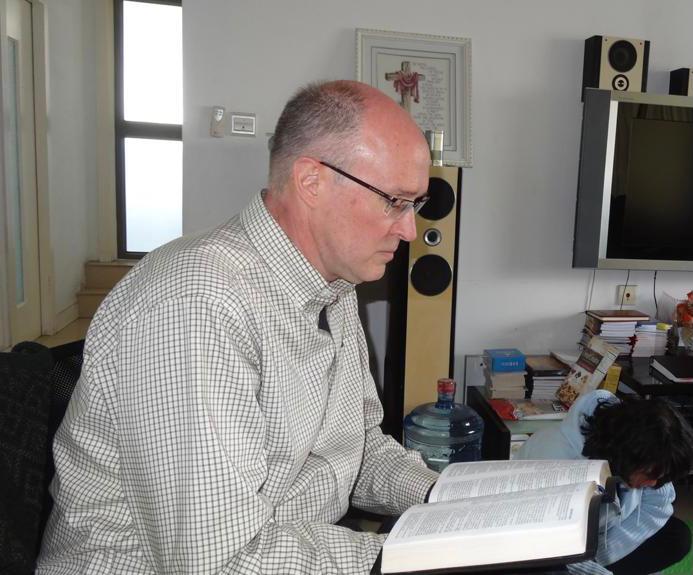
“Simon son of John, do you love Me more than these?”
“Yes, Lord, You know that I love You.”
Jesus said, “Feed My lambs.” (John 21:15)
“This is love: not that we loved God but that He loved us and sent His Son as an atoning sacrifice for our sins. Dear friends, since God so loved us, we also ought to love one another.” (I John 4:10-11)
“He has sent Me to proclaim freedom for the prisoners.” (Luke 4:18)
2. Seeking Joy in God Brings Life Transformation Like Nothing Else
I will remember his all-out pursuit of real JOY in God and in others. Robert Walter wanted to suck all the marrow out of life so that he could experience (not just know about) all the joy that Jesus had for him. How did he do this? He was, by far, the best at direct personal affirmation of anyone I have known or heard of. If I shared a small thing I was doing in ministry he would be over-the-top excited as he gave me a high five or hugged me, saying, “Wow, Brent! That is tremendous! God really used you and it was great how you designed that experiential element into the training. That makes me so happy! You are the man!” I sometimes wondered if this response was for real. But everything was real for this man, because he had experienced the real thing and he was not afraid to affirm, both when he felt like it and when he did not feel like it.
Robert had deeply studied the unity of spirit and body and emotions and believed in what gratitude and affirmation could do to a person. He also knew the secret that the one affirming also gets a boost in joy.
Because we talked about it so much at one point after his “extra affirmation,” I teased him, “I know what you are doing, Robert! You want the positive effects of affirmation in your own heart! You are not going to get away with it!” And then I proceeded to “affirm back” what he had just given me. In the years following I watched him do this for people over and over. And as a result he was a very positive man. Of course he had down times, but he practiced what the Bible says in his pursuit of joy.
He so believed in this that in the last months of his life he started a group online with the “affirmation challenge” where he challenged people to affirm one person a day for 30 days. He directly called someone for about 30 days and I was one of the people. He’d tell me, “They just don’t get it. Merely writing in our chat that you are thankful for a person is okay, but doing it directly to the person sucks all the juices out of affirmation!” So here he was, in between his rounds of chemotherapy, finding ways to pursue joy in others.
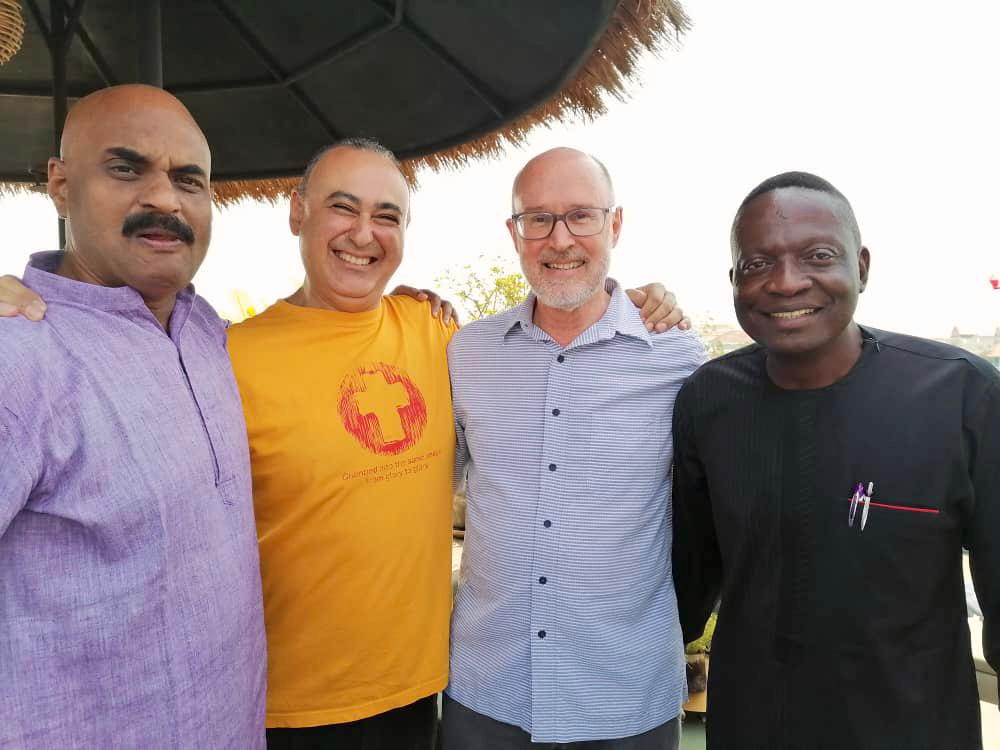
What was the result of such a radical, intentional pursuit of joy? People walked away from Robert feeling joyful and at peace. They had a courage to live and a deeper faith in God. Lesser motivations might be trying to get leaders more involved in doing more projects or to listen to more of your teachings. But for Robert it was about the person – he wanted them to be set free.
To him the body, brain, soul, and emotions all lived in one intimate unity. Some people can be affirmed and they are set free by it. But others have deeper issues. He wanted to see people set free spiritually and emotionally from guilt and shame and he knew the Gospel was the answer. But he saw how deficient our Gospel teaching and discipleship was in this area. So, in typical Robert fashion he went headlong into the pursuit of being used by God to set people free from emotional wounds through prayer.
In the hotel room at night sometimes it was hard to get to sleep because we would share stories of God’s work in people. He knew a woman who had been deeply emotionally wounded and had been in counseling for years. Yet she was set free in radical ways through an experiential prayer with Jesus that Robert led her through. This fascinated him as a pastor because he had hit roadblocks with people and was not sure at times how to help them. He knew it could not be just through his leadership or merely more biblical instruction – it had to be Jesus Christ Himself. It had to be both truth and the experience of the power of the truth.
And the more he saw people joyfully set free, the more joy and power he had to keep going in ministry. It was addicting. I believe he would tell leaders today to not stop short of Jesus’ goal for people. Sometimes this extends into physical healing; once when he was in Asia, God healed a man’s skin disease before his eyes. Regardless of the issue, as leaders we will face all kinds of human needs. What is the goal? One of the highest is joy. Robert had both a personal discipline of training and a ministry model that allowed him to do that.
“These things I have spoken to you, that My joy may be in you, and that your joy may be full.” (John 15:11)
“The friend of the bridegroom, who stands and hears him, rejoices greatly at the bride-groom’s voice. Therefore this joy of mine is now complete. He must increase, but I must decrease.” (John 3:29-30)
“So there was much joy in that city.” (Acts 8:8)
3. Dreams of Impactful Leadership Include Massive Doses of Learning
Humility is the starting place of all learning. Robert knew he was only an instrument of God but that God had given him capacities to use for God’s glory and that it would take work. He worked endless hours to perfect his craft – writing ministry courses, designs, and articles. But what impressed me most is how he would attack a subject and learn everything about it.
He would start out with almost zero knowledge and six months to a year later he was an expert in it, whether it was how to design and launch a website, do video lighting and sound, get into investment finances, or learn about the human brain and well-being. His humility also showed in how he was willing to learn from others.
Sometimes we sit far too long before moving towards a deep immersive learning in some area of the Bible, ministry, or some practical skill. But for Robert, this was his life.
“Give instruction to a wise man, and he will be still wiser; teach a righteous man, and he will increase in learning.” (Proverbs 9:9)
4. One of the Best Ways to Love is to Listen Well and Be Fully Present
Everyone on that three-hour memorial service confirmed it: this was a man who truly listened to others. The very best part of his relational skills was listening deeply and matching your emotion or even going beyond it in his response to you. For example, he was not a great lover of football, but living in Texas where football is so huge, he would get excited about what people were excited about. He was 100% present with you and your feelings. He listened for the heart of what you were sharing and he repeated it, brought it out, and asked you to share more about it. This was something he grew in and practiced. I saw this when we attended a training that was specifically focused on communication, the brain, emotions, and discipleship. He did not have his own children but with others he always asked about their children and he was truly excited or concerned about them.
As leaders we are tempted to downplay someone’s emotions. Robert never tried to do this. Instead he empathized wholeheartedly and this is why people felt loved, because love is listening. Related to this is that truly listening is a part of being fully present with someone. Robert never looked over your shoulder for someone important to talk to. When you were with him you were the most important person in the room.
“Everyone should be quick to listen, slow to speak and slow to become angry…”(James 1:19)
5. Growing in a True Relationship with God Takes Time, Work, and Rest
Sometimes Robert was emotionally down, and he shared this freely. Robert had learned emotional honesty and to not put himself on a pedestal where he could not be ministered to by others. In his last months of life he was receiving prayer ministry for his emotional state. I asked him why and he said it was to make sure nothing in his past memories or past hurts was affecting his intimacy with Jesus. At 65 years old, this pastor, missionary, counselor, encourager, and Bible teacher needed to grow in his walk with Jesus. He said he was asking Jesus to heal him of things that happened years ago.
Days before his death he gave me an interview I had been longing to do with him because I knew he had spent an entire week in a silent retreat with God – and he had done this for years. What would drive a busy minister to block out an entire week each year and spend it in silence? It was his own past. “I had become burned out. Ministry had become too valuable to me. God pierced my heart with a Scripture that told me that strength would come in rest and silence.”
So this became a practice in his life. A relationship with Jesus was not automatic or a mere theological truth that he held onto. Theology was supremely important to Robert, but it had to be a living truth with God, Emmanuel. And studying Scripture, solitude, silence, reflection, and quiet took time. In his parting words he asked us to see ourselves in a marathon race and to set our pace and find our rest in Jesus so that we may run well and last.
For thus said the Lord God, the Holy One of Israel, “In returning and rest you shall be saved; in quietness and in trust shall be your strength.” But you were unwilling. (Isaiah 30:15)
Robert Walter lived as a Christian leader in the 21st century with all its busyness, frustrations, disappointments, and temptations. He would be the first person to say that he was far from a perfect example. He was a son of God who was growing into his identity in Christ. He courageously faced his need to be healed and to grow, and this helped make him into a leader we can all learn from.
He finished his marathon race on February 4, 2021.
On that day he entered into the Presence of God and heard His Master say, “Well done, good and faithful servant. You have been faithful over a little; I will set you over much. Enter into the JOY of your Master (Matthew 25:23).”
And Robert started dancing in the fullness of that joy!
